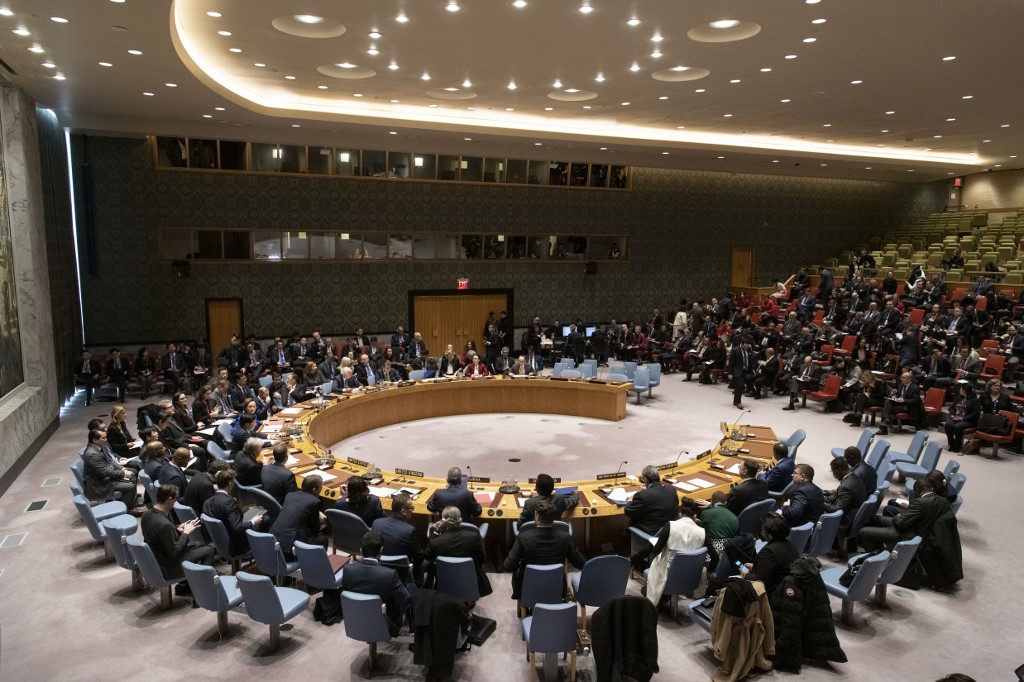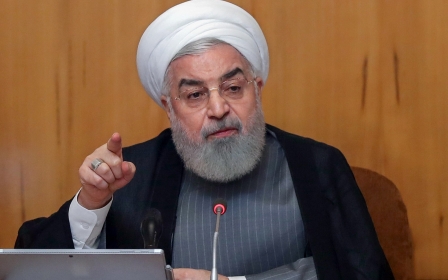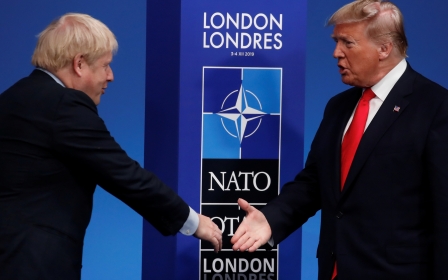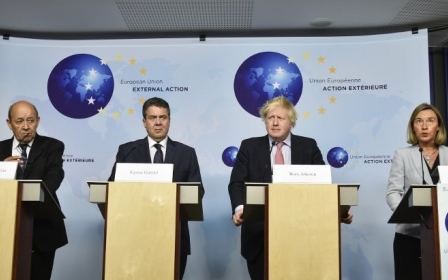Deal breaker: Europe's 'nuclear Orientalism' towards Iran

The recent decision by France, Germany and the UK to trigger the Iran nuclear deal’s dispute resolution mechanism is a bad-faith attempt that will lead to the demise of the deal, which has been on life support since the unilateral US exit in May 2018.
Iran has denounced the decision by the three European countries as a grave error, and Foreign Minister Mohammad Javad Zarif has warned that if it leads to the reimposition of UN sanctions, Iran will quit the nuclear Non-Proliferation Treaty (NPT).
Characterising their action as a “good faith” attempt to salvage the nuclear deal, the three countries are excelling in the art of hypocrisy, blaming Iran for “not meeting” its nuclear obligations with a straight face, while claiming that they have fully lived up to their part of the bargain.
Perilous path
Indeed, the 14 January statement by France, Germany and the UK ought to make George Orwell shiver in his grave. It is a fresh reminder of the neocolonial context of our time, with purportedly civilised Western nations engaging in foreign policy by assassination and wilful disregard for the UN Security Council, while having the audacity to turn the UN into an instrument of their oppressive policies to blame and penalise Iran.
New MEE newsletter: Jerusalem Dispatch
Sign up to get the latest insights and analysis on Israel-Palestine, alongside Turkey Unpacked and other MEE newsletters
Compounding their previous failure to take action against the illegal US exit from the nuclear deal, European governments have now embarked on a perilous path that does not bode well for European diplomacy and security interests.
Europe has in effect become complicit in US President Donald Trump's unlawful 'maximum pressure' strategy against Iran, despite European rhetoric to the contrary
Threatened with US sanctions unless they followed Washington’s footsteps on Iran, Europe has behaved badly, trading its independence for US servitude.
Europe has done nothing to counter US sanctions on Iran, other than to set up a paper mechanism known as INSTEX (Instrument in Support of Trade Exchanges), which had yet to conduct a single transaction months after it was announced.
Similarly, the Blocking Statute, meant to protect the European firms engaged with Iran from US extraterritorial sanctions, has proved completely useless due to the lack of an enforcement mechanism. Nor have European promises of billions in credit lines to Iran materialised, reflecting a Europe that is stillborn in its stance against Trumpism.
Ironically, in their 14 January statement, France, Germany and the UK claimed they had “no choice” but to trigger the dispute resolution mechanism, which will likely result in the snapback of UN sanctions. In fact, they could have combined their denunciation of Iran’s “escalatory” countermeasures with a direct condemnation of US moves against Iran, which violate the terms of nuclear deal.
Travesty of justice
The UN Security Council is now potentially set to become the tragic scene of a spectacular travesty of justice, wherein the other non-compliant parties to the nuclear deal get away with their unlawful dereliction of duty - and, worse, have the audacity to inflict penalties on Iran for refusing to fall for blatant double standards.
Lest we forget, Iran stopped its compliance with the nuclear deal in direct response to Europe’s non-compliance, a tit-for-tat. Tehran said these measures would be reversed if the other signatories respected their obligations, including Europe’s commitment to facilitate the normalisation of Iran’s foreign trade and provide access to Europe’s financial system.
Europe has in effect become complicit in US President Donald Trump’s unlawful “maximum pressure” strategy against Iran, despite European rhetoric to the contrary.
Hurling Iran’s nuclear file back to the bosom of the UN Security Council could further aggravate the situation, notwithstanding Iran’s threat to exit the NPT if that happens. Why should Iran respect any international treaty when the “civilised” West fails to do so?
The West’s attitude towards Iran smacks of Orientalism, a racist superiority complex rooted in a history and ideology of domination, which smears the Muslim “other” as inferior and unworthy of equal rights.
Europe’s “nuclear Orientalism” has brought us to this stage, underscoring an outdated worldview that expects Iranians to suffer the pains of Western economic warfare without an iota of resistance.
The false narrative that the Europeans have done all they can to preserve the nuclear deal, hailed as a singular achievement of European diplomacy not long ago, must be exposed for what it is: a blatant lie that cannot withstand critical scrutiny.
Western neocolonialism
The claim that their full compliance with the nuclear deal hinges on Iran’s implementation of its commitments is yet another unsupported assertion, in light of the simple fact that prior to Iran’s retaliatory countermeasures beginning in May 2019, Tehran was in full compliance, while Europe was in full non-compliance.
Considering Articles 26 and 36 of the nuclear deal, Iran has a strong hand in defending its nuclear countermeasures in the face of Western non-compliance, which will undoubtedly be showcased at upcoming debates at the UN Security Council. France, Germany and the UK will be hard-pressed to prove that they have been in compliance with the agreement.
Iran’s diplomacy at the UN should convince much of the international community that the idea of European countries penalising Iran while guarding themselves against any backlash over their historic failures represents a flagrant case of Western neocolonialism. They are abusing UN machinery to advance their nefarious aims against an assertive developing nation that has the audacity to stand up to their imperial machinations.
Should the UN ultimately reimpose sanctions on Iran, this would trigger a global outcry not only against these arrogant Western powers, but also against the pre-eminent world organisation that is supposed to uphold civilised international norms, rather than becoming a puppet of Western domination.
Sending a clear message
In a word, the damage to the UN’s credibility would be severe and long-lasting - not to mention the damage to the global non-proliferation regime, given Iran’s threat to quit the NPT in light of the European illogic of seeking to enforce the nuclear deal selectively, with total disregard for the dire consequences of the US withdrawal.
What is needed today - and what is conspicuously absent - is European 'smart diplomacy'
What is needed today - and what is conspicuously absent - is European “smart diplomacy”, cognisant of the need to engage in fair play with Iran rather than emulating US-style coercive diplomacy via new UN sanctions, which would be a recipe for disaster.
That would mean making proper use of the nuclear deal’s Joint Commission, established to resolve disputes on the accord’s implementation; activating INSTEX without any further delays; and sending clear and unambiguous signals to the US that the continent will not follow Trump’s ruinous policy on Iran, which has brought us to the brink of war.
The views expressed in this article belong to the author and do not necessarily reflect the editorial policy of Middle East Eye.
This article is available in French on Middle East Eye French edition.
Middle East Eye delivers independent and unrivalled coverage and analysis of the Middle East, North Africa and beyond. To learn more about republishing this content and the associated fees, please fill out this form. More about MEE can be found here.






